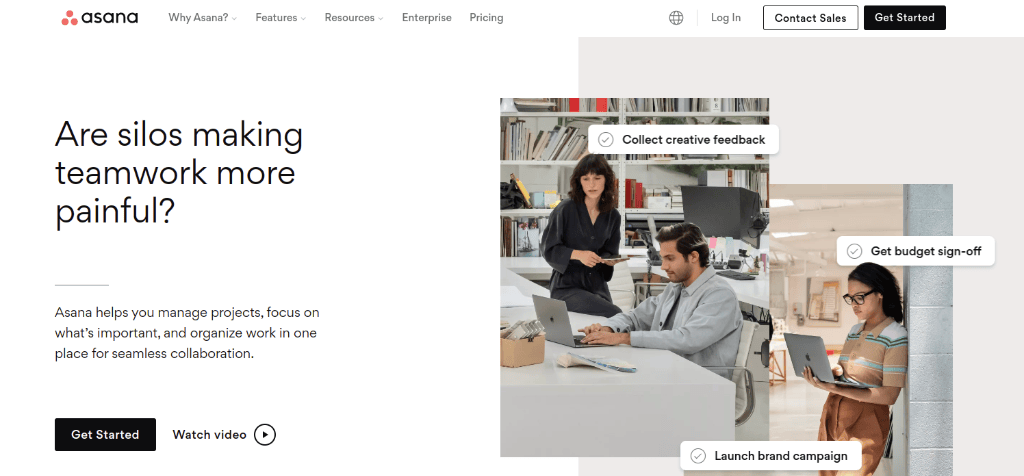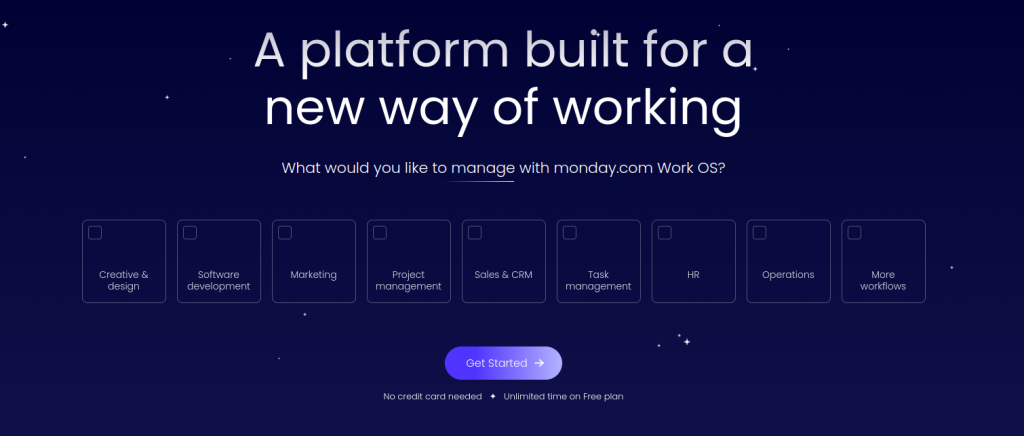Are you looking for exceptional Basecamp alternatives?
Table of Contents
- The best alternatives to Basecamp in 2023
- Why look for basecamp alternatives?
- Drawbacks of Basecamp
- 10 Best Basecamp alternatives & competitors in 2023
- ProofHub cons
- How I picked the best Basecamp alternatives list
- How to choose the ideal Basecamp alternative for your team?
- Conclusion
- FAQs
- What is Basecamp?
- What are the drawbacks of Basecamp?
- Does Basecamp has time tracking feature?
- Which tools does Basecamp has integration with?
- How much does Basecamp cost annually?
- Is ProofHub the best Basecamp alternative?
- What is the best project management software for small enterprises?
- When should I choose Basecamp as my project management software?
- What are some of the best basecamp alternatives and competitors?
The best alternatives to Basecamp in 2023
1. ProofHub – Best for project management & collaboration
2. ClickUp – Best for workflow customization
3. Wrike – Best for large companies
4. Asana – Best for task management
5. TeamWork – Best for client management
6. Monday – Best for team collaboration
7. Airtable – Best for custom workflows
8. Hive– Best for hybrid work management
9. Trello – Best for Kanban workflow
10. Freedcamp – Best for basic project management
Do you and your team feel restricted by the features provided by Basecamp, making it difficult to justify the steep $299 per-month flat-rate pricing for the more advanced plans?
Although Basecamp has a well-established reputation and has been around for a considerable time, it may no longer adequately meet your team’s collaboration and project management requirements.
Don’t worry, we understand the frustration. That’s why we’ve put in the time and effort to research 10 of Basecamp’s top competitors and analyzed each one based on key factors like pricing, ease of use, features, and customer ratings.
After careful consideration, we’ve narrowed it down to the top ten Basecamp alternatives. We know that every business is unique and has its own set of needs and budget limitations. That’s why we want to empower you to make the best choice for yourself.
So, let’s dive in and find the perfect project management tool for your team.
Why look for basecamp alternatives?
Basecamp has been a go-to project management tool for many years, favored for its user-friendly interface and collaborative approach to managing projects. However, over time, the needs of customers have evolved, and many have started seeking tools that offer more than just project management capabilities. In fact, many of our customers have shifted from Basecamp to ProofHub.
As a result, the market has seen a surge of new project management tools offering improved features for project management and collaboration. Basecamp fell short of being the ideal tool as it only provided basic features that were already available in older project management tools. As a result, it became apparent that Basecamp had its limitations and its primary lacking areas are as follows.
Drawbacks of Basecamp
Overall, Basecamp is a solid choice for teams who want an easy-to-use project management tool that promotes collaboration and integrates well with other platforms. But it has its own downside, so make sure to consider the potential drawbacks before you dive in!
- Limited Customization: Basecamp has a standardized interface and limited customization options. No templates, no color schemes, no personal interface—This lack of flexibility may make it challenging to tailor the platform to specific team or project needs.
- Limited Insight: With Basecamp, information is not only scattered all around the project dashboard, but it’s also limited. Project start date, budget allocation, task dependencies, etc—there are a lot of project details that you won’t be able to find in Basecamp.
- Lack of Advanced Project Management Features: Basecamp’s focus is on simplicity, which means it may lack certain advanced project management functionalities that some teams require. For instance, it may not have robust resource management, multiple project views, advanced task management, or time tracking.
- Limited Reporting and Analytics: Basecamp’s reporting and analytics features are relatively basic. If your team relies heavily on data-driven insights and comprehensive project reporting, you may find Basecamp’s reporting capabilities lacking.
- Communication Structure: Basecamp’s communication structure is primarily centred around message boards and comment threads. While this can be effective for certain types of collaboration, it may not provide the real-time, instant communication channels required for highly dynamic teams.
- Pricing: Basecamp’s pricing can be considered steep for some users, especially when compared to other project management alternatives that offer similar or more advanced features at a lower cost.
- No Recurring Tasks: There are tasks and deliverables on your to-do list. Some of these are repeated daily. Unfortunately, Basecamp does not allow users to set recurring tasks. It is why so many are looking for Basecamp Alternatives that offer this feature.
10 Best Basecamp alternatives & competitors in 2023
Below, you’ll find a curated list of ten exceptional alternatives to Basecamp that are tailored to meet the specific needs and preferences of your teams. Let’s not waste any time and dive straight into exploring these alternatives, helping you discover the ideal solution for your requirements.
1. ProofHub – Best for project management & collaboration

Leading the list of Basecamp alternatives is ProofHub, an advanced project management and team collaboration tool that stands out with its extensive range of features. With ProofHub, your teams can efficiently handle project management tasks and seamlessly collaborate.
ProofHub is an innovative solution designed to eliminate the need for traditional business practices and streamline your operations. The idea behind this tool is pretty straightforward and intuitive – it aims to help project managers, decision-makers, and teams communicate better and manage every aspect of the project with greater efficiency.
So far, the tool is successfully accomplishing what it aimed for by serving both small groups and large businesses worldwide, including some big names like Netflix, Google, Disney, NASA, Nike, Pinterest, TripAdvisor, and Taco Bell.
ProofHub main features
Here’s why ProofHub is better than Basecamp. The standout features:
- One tool for all
ProofHub stands out from Basecamp by providing an all-in-one platform that fulfills all your project management requirements. It doesn’t matter if you’re a startup, a large enterprise, or a non-profit organization; ProofHub has something to offer everyone.
Within ProofHub, you can efficiently manage tasks, projects, calendars, timesheets, and even communicate with your team through the built-in chat feature. This eliminates the need to juggle multiple apps or tools since ProofHub consolidates everything you need in one centralized location. With ProofHub, you have a comprehensive solution that streamlines your project management processes and enhances collaboration within your team.
- Maximize project planning efficiency
ProofHub’s Gantt Chart Software empowers project teams to effectively plan and visualize various aspects of a project through a timeline view. Within ProofHub, teams can easily add tasks, assign them to one or multiple team members, establish task dependencies, and make schedule adjustments as work progresses.
- Customizable workflow
ProofHub offers project managers a distinct advantage with its Custom Roles functionality. This feature allows managers to have complete control over user permissions and access rights within the platform. Managers can precisely define what actions team members and clients can perform, as well as regulate their access to specific sections based on their roles and responsibilities.
This level of granular control is not available in Basecamp, making ProofHub a valuable tool for managers seeking enhanced control and customization options within their projects.
- Collaborate with ease
Basecamp has a major drawback in regard to collaborative capabilities. In contrast, ProofHub offers an array of features that make workplace collaboration smart and easy. It makes the team and client conversations quicker with one-on-one and Group Chats. Plus, it allows you to create discussion topics and have all your discussions in one place instead of having to go back and forth in lengthy email threads.
- Stay on top of deadlines
Unlike Basecamp, ProofHub allows its users to schedule events, tasks, and milestones in one place using ProofHub Calendar. They can set reminders for important dates, see recurring events and tasks, check the project milestones set for a month, or the tasks for the same day with just a few clicks.
- Track time easily
ProofHub enables you to track time and maintain Timesheets while you work on task/tasks. In addition, you have the option to generate customized time reports that provide a comprehensive overview of the tracked time. while Basecamp fails to provide this basic functionality. It does offer 3rd party extensions to fill the gap but it’s no good.
- Built-in online proofing tool
While Basecamp does provide third-party extensions for proofing files and sharing feedback online. ProofHub differentiates itself by offering a dedicated built-in Online Proofing tool. ProofHub simplifies the review and approval process by bringing all stakeholders to a single platform for seamless collaboration and real-time feedback sharing on files.
With ProofHub’s Online Proofing tool, teams can conveniently gather feedback, make revisions, and track progress, all within a unified environment. This integrated approach enhances efficiency and eliminates the need for relying on external extensions or additional tools for file proofing and feedback collaboration.
ProofHub pros
- Flat pricing with unlimited users and unlimited projects
- Intuitive user experience
- Dedicated customer support
- Seamless collaboration tools
- Customizable workflows and project templates
- Mobile app for on-the-go access
- Efficient resource allocation and workload management
- Easy-to-use file sharing and document management
- Real-time notifications and reminders for deadlines and updates
ProofHub cons
- Lacks budgeting tools
ProofHub customer rating
- G2 – 4.5 out of 5 stars
- Capterra – 4.6 out of 5 stars
ProofHub pricing
ProofHub offers flexible pricing plans that cater to the varying needs of individuals and teams. It offers two pricing plans: Essential and Ultimate Control.
- The Essential plan starts at $45 per month and provides access to all of the basic features, including task management, team collaboration, and file sharing.
- The Ultimate Control plan, which starts at $89 per month, includes all of the features of the Essential plan, plus additional features such as time tracking, reports, and project templates.
Unlike many other project management tools, ProofHub’s pricing is competitive and includes unlimited users, projects, and storage, with no additional per-user costs. Plus, its all-in-one nature eliminates the need for additional software and tools, saving you money and streamlining your workflow.
Moreover, ProofHub’s pricing is transparent, and there are no hidden fees or charges. You pay only for what you need! This flexibility allows you to scale your subscription up or down as your team’s needs change.
So again, why choose ProofHub over Basecamp?
Overall, ProofHub offers more features, enhanced collaboration tools, a user-friendly experience, competitive pricing, and a customer-centric approach. These factors make ProofHub a compelling choice for teams looking to optimize their project management processes and achieve better results.
|
2. ClickUp

ClickUp is a project management tool to help teamwork, connect, and improve workplace productivity from a centralized location. It offers an intuitive UI, and 15 customizable views to help teams develop scalable workflows, which makes it one of the Basecamp Alternatives. ClickUp also integrates seamlessly with more than 1000 work tools to streamline work processes. It also lets teams import all work from Trello in less than 60 seconds.
ClickUp main features
- Create custom statuses
- Beautiful multitask toolbar
- Offers 500+ integrations
ClickUp pros
- Easy to use
- Endless customization options
- Improved team collaboration features
- Good pricing plans
- Wide App integrations
ClickUp cons
- Steep learning curve
- Limited time tracking
- Overboard notifications while first signing up
- Needs SCIM provisioning
- Takes time to load
ClickUp customer ratings
- G2 – 4.7 out of 5 stars
- Capterra – 4.7 out of 5 stars
ClickUp pricing
Available for free (100 MB storage and unlimited projects) and $5/user/month (unlimited storage and projects).
3. Wrike

If you’re looking for a more comprehensive online project management tool than Basecamp, Wrike is a great alternative – especially for larger teams. With its folder and subfolder system, you can easily stay organized. Wrike’s interface is intuitive and powerful, with excellent documentation and resource tracking to help you find what you need.
Wrike main features:
- Detailed time-tracking that allows you to keep track of time spent on each task
- Excellent documentation and resource tracking to locate what you need
- Customizable dashboards to create personalized views of project data
- Sort tasks by deadlines and progress, and pin important ones at the top to optimize your task list.
Wrike pros
- Intuitive, powerful interface
- Powerful mobile app
- Powerful integration with cloud storage apps such as Dropbox, Box, and Google Drive
- Collaborate on files in real-time, and notify concerned parties by tagging them
Wrike cons
- Doesn’t have a note-taking tool
- Free plan has basic features
- No proper chat integration for communication
- Breaking down work into multiple tasks can be overwhelming and confusing at times
Wrike customer ratings
- G2 – 4.2 out of 5 stars
- Capterra – 4.3 out of 5 stars
Wrike pricing
Wrike offers four pricing plans – Free, Professional starting at $9.80/user/month, Business starting at $24.80/user/month, and a customizable Enterprise plan. Each plan comes with a varying degree of features and is designed to meet the needs of different businesses.
4. Asana

Asana specializes as a powerful task management tool and is one of the Basecamp Alternatives you should try. It offers a bevy of tools to help teams manage daily tasks, information, and processes with ease. Asana is used by small businesses, but those looking for effortless team collaboration are big fans of this tool. It makes collaboration simple, monitors task progress in real-time, and promotes effective task allocation and completion.
Asana main features
- Track projects from start to finish
- Simple to use and intuitive
- Effective task management / Prioritize tasks and streamline task management
- Advanced reporting and analytics
Asana pros
- Simple UI and easy-to-use
- Offers clear Calendar overview sync with all tasks
- Supported on multiple devices
- Option to create custom workflow
- Added time-tracking feature recently
Asana cons
- Steep learning curve
- Single assignee for tasks
- Limited exporting options
Asana customer ratings
- G2 – 4.3 out of 5 stars
- Capterra – 4.5 out of 5 stars
Asana pricing
The basic task management plan is totally free. This is specifically for small teams or individuals who work individually.
For more advanced features and to handle teams efficiently, you can go premium for US$10.99 or business for US$24.99, charged per member per month and billed annually.
Make Project Management and Team Collaboration Effortless with ProofHub! Try for Free!
5. TeamWork

Teamwork is one of the many Basecamp competitors that offer world-class client management solutions to streamline your business. It is loved by 40,000 creative teams, agencies, and enterprise businesses. Additionally, Teamwork’s integrated billing and invoicing functionality makes it a perfect fit for teams that manage client work. Whether you are working with a small team or a large enterprise, Teamwork provides a reliable platform for optimizing your project management processes.
Teamwork main features
- Real-time status updates
- Manage overall client review & approval process
- Impressive invoice-tracking
- Advanced privacy and permission options
- Available on iOS, Android, Google Chrome, and the Web
Teamwork pros
- Fully-featured project management system
- Multiple inboxes to eliminate email chains
- Activity tracker to keep everyone updated about tasks & task lists
- Built-in teamwork apps & 3rd-party tools
- Visualizes project data & metrics
Teamwork cons
- Limited CRM functions
- No PDF or image markup tools
Teamwork customer ratings
- G2 – 4.4 out of 5 stars
- Capterra – 4.5 out of 5 stars
Teamwork pricing
For small teams (5 users per plan) the free client management plan is worth it.
For more advanced features and to handle big teams efficiently, you can try advanced plans starting from $5.99 per user/month billed annually.
6. Monday

Monday was formerly known as Dapulse. The collaborative software is visual and quite intuitive in nature. It is used to create tasks that can be assigned to team members. Further, you can attach files, mark deadlines, and track along the way to see if things are on track or not. Plus, it can be customized to fit your exact workflow. It comes with many templates, so you can use it the way you want.
Monday main features
- Keep all your conversations, files, briefs, checklists, and sheets in one place
- Enables project scheduling and file sharing
- Powerful reporting and analytics features
- Offers pre-built templates that are highly adaptable, enabling you to enhance collaboration
Monday pros
- Intuitive UI
- Easy Collaboration
- File sharing
- Customizable task boards
- Streamlines task & team management
Monday cons
- Overwhelming for new users
- Video upload limit of 500MB
- Mobile application is not supported as a desktop application
Monday customer ratings
- G2 – 4.7 out of 5 stars
- Capterra – 4.6 out of 5 stars
Monday pricing
Monday.com provides a free plan for individuals who want to manage and track their own work.
To manage teams, collaborate, and optimize your team processes, opt for more advanced plans, starting at $24 per month billed annually.
7. Airtable

Airtable is one of those Basecamp alternatives that are known for great custom workflows. It offers multiple views for tasks at hand – Grid, Calendar, Kanban, Gallery, and Form to view project boards and schedules. It easily integrates with third-party applications like Dropbox, and Google Drive in addition to different project management tools like Asana, Basecamp, GitHub, and more. You can organize that data using Airtable to best fit your needs, and then use Airtable’s automation to build sophisticated, logic-based workflows on top of the data in your base.
Airtable main features
- Capture and share new insights with powerful visualization and formatting tools.
- Collaborate in context and keep your team on the same page
- Backup is done automatically and it doesn’t even eat server space
- Option to turn task cards into forms (something that Basecamp doesn’t offer)
- Pre-made templates for creating quick Airtable base
Airtable pros
- Easy to use
- API integration
- Great visual design
- Highly customizable
- A centralized place to store and track all tasks
Airtable cons
- Steep learning curve
- Slow loading time
- The mobile app is not responsive
- Formula Syntax needs improvement
- No advanced reporting features
Airtable customer ratings
- G2 – 4.6 out of 5 stars
- Capterra – 4.7 out of 5 stars
Airtable pricing
Airtable provides a free plan for individuals and small teams.
To manage large teams and have more advanced features, try paid plans starting at $10 per seat billed annually.
8. Hive

Hive is a project management platform that is tailored for hybrid work and designed with user feedback in mind. This all-in-one tool combines team messaging and project deliverables on a single page, making it a compelling alternative to Basecamp. With Hive, you can effortlessly create and assign to-do lists to yourself or team members, track project progress using Kanban-style boards, and measure progress with Gantt charts.
Hive main features
- Provides a central platform for everything
- Move seamlessly between projects, messages, and files
- Access anywhere from a desktop or mobile apps
Hive pros
- Easy to use
- Easy task management
- Impressive file management
- Highly Adaptable to different project management methodologies
Hive cons
- Glitchy email attachment
- Design can be more visually appealing
- The project hierarchy is confusing for new users
Hive customer ratings
- G2 – 4.6 out of 5 stars
- Capterra – 4.5 out of 5 stars
Hive pricing
Small teams can try a free plan for a basic project management plan. To manage large teams, multiple projects, and a full enterprise, opt for more advanced plans, starting at $12 per user per month.
9. Trello

Trello offers some impressive task management features, best known for its Kanban workflow. Along with this, it offers lists, and cards to help you organize and prioritize all projects in a fun, flexible way. The Kanban boards provide an effective method for visualizing and managing tasks, making it easy to set priorities and track progress in real-time. Trello lets you work more collaboratively and get work done, which makes it better than Basecamp.
Trello main features
- Follows a visual approach to represent projects
- Add comments, attachments, and more directly to Trello cards
- Trello stays in sync across all of your devices
Trello pros
- Easy to use and great UI
- Efficient search function
- Smooth integration with Slack
- Ample task filtration feature
- Efficient mobile application
Trello cons
- No option to share confidential documents
- Hard to understand automation process
- Integrating Excel with Trello is not easy
- No List view before the paid subscription
- No time tracking
Trello customer ratings
- G2 – 4.2 out of 5 stars
- Capterra – 4.5 out of 5 stars
Trello pricing
Trello offers a free basic plan for individuals and small teams to organize any project. Advanced plans for all small teams, large teams, and organizations, who want to manage and scale collaboration using advanced features. The advanced plans start at US$ 5/user/month, billed annually.
10. Freedcamp

Freedcamp is a simple and user-friendly project management solution that provides a variety of basic functionality for project management. It is loaded with amazing features – project templates, white-labeling, task boards, and CRM to name a few. Freedcamp offers everything your team needs to successfully complete any project. It is a true-blue collaboration and collaborative tool that makes life more productive and enjoyable.
Freedcamp main features
- See an overview of your due items from one place
- Discuss ideas with your team from one centralized place
- Bill your clients easily from your time tracking entries or create new list items
- Manage tasks outside the office with its mobile app
Freedcamp pros
- Easy to use
- Easy-To-Do list management
- Task tracking with Google Calendar integration
- Integration with Google Drive, One Drive, and Dropbox
Freedcamp cons
- Mobile App is far behind the web version
- No download option for different stages of projects
- No integration between CRM, invoice, and task modules
Freedcamp customer ratings
- G2 – 4.5 out of 5 stars
- Capterra – 4.6 out of 5 stars
Freedcamp pricing
Freedcamp provides a free plan with basic project management features.
For advanced management, you can go with paid plans. The Pro plan starts at $1.49 per user/month, billed annually. You can also opt for business and enterprise plans.
How I picked the best Basecamp alternatives list
My team and I personally evaluated a range of project management tools available in the market, taking into account user reviews, user interface and its over all functionality. We then carefully considered the essential factors determining a project management system’s suitability for effective project management.
We took into consideration several factors that make a project management system a viable option, such as:
1. Ease of Use: A good project management tool should be user-friendly and easy to navigate, even for non-technical users. We looked for programs that have an intuitive design and offer a smooth onboarding process.
2. Collaboration: Effective collaboration is essential for successful project management. We evaluated tools that allow for seamless communication, task assignment, and progress tracking across teams.
3. Customization: Different teams have different needs, and a one-size-fits-all approach may not work. We assessed systems that offer customizable workflows, integrations with other tools, and the ability to tailor the software to our specific requirements.
4. Project Tracking: Keeping track of tasks and deadlines is crucial for project success. We looked for tools that offer features such as progress tracking, Gantt charts, and reporting capabilities to ensure we can stay on top of our project management.
5. Pricing: The cost of a project management tool is a significant factor to consider. We evaluated systems that offer competitive pricing plans and flexible options to suit different budgets.
Overall, our evaluation helped us identify the top Basecamp alternatives that can meet your project management needs, and we are happy to share them with you to manage your projects more efficiently.
How to choose the ideal Basecamp alternative for your team?
Choosing the ideal Basecamp alternative for your team can be a daunting task, given the plethora of project management tools available in the market. However, by considering the following factors, you can narrow down your options and select a tool that is adequate and caters to your team’s needs and preferences.
1. Understand your team’s requirements: Before you start evaluating different tools, it’s essential to understand your team’s requirements. Different teams have different needs, and it’s crucial to put more emphasis on identifying your team’s pain points and areas of improvement. Ask yourself questions such as:
- What kind of projects do we work on?
- What features are essential for us?
- How many people will be using the tool?
- What’s our budget?
Understanding your team’s requirements will help you identify the must-have features that a tool should offer.
2. Consider ease of use: The ideal tool should be easy to use, even for non-technical team members. Look for a tool that has an intuitive interface and offers a smooth onboarding process. The easier it is to use, the faster your team can adapt to it, and the more productive they will be.
3. Evaluate collaboration features: Collaboration is a crucial aspect of project management. Look for a tool that offers features such as task assignment, progress tracking, and seamless communication across teams. The tool should make it easy for team members to collaborate and share information.
4. Customization options: Different teams have different workflows and requirements. Look for a tool that offers customization options such as the ability to create custom workflows, integrations with other tools, and the ability to tailor the tool to your specific requirements.
5. Project tracking and reporting: Keeping track of tasks and deadlines is crucial for project success. Look for a tool that offers features such as progress tracking, Gantt charts, and reporting capabilities. The tool should provide you with insights into how your projects are progressing and help you identify areas for improvement.
6. Consider your budget: Cost is an essential factor to consider when choosing a tool. Look for a tool that offers competitive pricing plans and flexible options to suit different budgets. However, don’t compromise on features for the sake of cost. Ensure that the tool offers the essential features that your team needs.
By considering these factors, you can identify the ideal Basecamp alternative that meets your team’s requirements and preferences. Keep in mind that different team members may have different priorities, so involve them in the evaluation process to ensure that everyone’s needs are met.
Conclusion
I hope you found the above information useful. In case you missed it, we’ve gone through a range of tools that can replace Basecamp. From basic collaboration tools to end-to-end project management platforms, we’ve covered it all.
Now, you’re probably wondering which tool would be the close fit for your team. My suggestion would be to try out the ones that caught your eye. This will give you a better idea of which one aligns best with your workflow.
And, don’t forget ProofHub. It comes with all the project management and team collaboration features of Basecamp and is as simple to use. Plus, it also has planning, task, and people management tools.
Book a demo with ProofHub and Upgrade Your Project Management, Team Communication, Time Tracking, and Reporting Experience.
FAQs
What is Basecamp?
Basecamp is a project management software. It helps teams plan, schedule and execute work effectively. All files, discussions, tasks, and status reports can be found at this one central location.
What are the drawbacks of Basecamp?
Lack of customization, no time tracking facility, no inbuilt chat or discussion feature, and inability to create recurring tasks are some of the drawbacks of Basecamp.
Does Basecamp has time tracking feature?
Although Basecamp does not have a built-in time tracking feature, it does provide the option to integrate with third-party apps for time tracking and progress monitoring.
Which tools does Basecamp has integration with?
Basecamp offers integration with more than 30 apps. These apps cover various aspects such as invoicing, accounting, marketing, charts, time tracking, customer support, file backup, reporting, etc.
How much does Basecamp cost annually?
Basecamp costs $15/user per month. The Pro Ultimate package costs $299/month (billed annually). The Ultimate package is not based on the number of users.
Is ProofHub the best Basecamp alternative?
Yes, ProofHub is a great alternative to Basecamp as it offers all the essential features of Basecamp, plus additional tools for project planning, task management, and people management.
What is the best project management software for small enterprises?
In my opinion, the best project management software for small enterprises is Asana. It’s user-friendly, affordable, and offers a wide range of features to help manage projects effectively.
When should I choose Basecamp as my project management software?
You should choose Basecamp as your project management software if you value simplicity and ease of use, as it offers a straightforward and user-friendly interface.
What are some of the best basecamp alternatives and competitors?
The best Basecamp alternatives and competitors include tools:
1. ProofHub
2. Scoro
3. WorkZone
4. Jira
5. Teamwork
